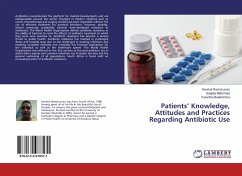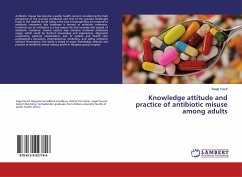
Antibiotic resistance of germs
Isolated urine of diabetics in Lubumbashi
Versandkostenfrei!
Versandfertig in 6-10 Tagen
27,99 €
inkl. MwSt.

PAYBACK Punkte
14 °P sammeln!
The first antibiotic resistance surveillance data published by the World Health Organization (WHO) show high levels of resistance to several bacterial infections in both high and low income countries. Urinary tract infections are more frequent and often more complicated in diabetics because several steps in the immune response are altered in them. At the end of cytobacteriological examinations of diabetic urine, 38 samples (76%) out of 50 were pathological. The germs isolated were distributed as follows: Escherichia coli was in the lead with 23 cases (60.5%); genus Klebsiella (K. ozaenae, K. o...
The first antibiotic resistance surveillance data published by the World Health Organization (WHO) show high levels of resistance to several bacterial infections in both high and low income countries. Urinary tract infections are more frequent and often more complicated in diabetics because several steps in the immune response are altered in them. At the end of cytobacteriological examinations of diabetic urine, 38 samples (76%) out of 50 were pathological. The germs isolated were distributed as follows: Escherichia coli was in the lead with 23 cases (60.5%); genus Klebsiella (K. ozaenae, K. oxytoca and K. pneumoniae) with 11 cases (29%); finally, the genera Salmonella and Enterococcus each occupied 2 cases (5.3%).Generally speaking, antibiotic resistance evolves on a case-by-case basis depending on the germ involved and the antibiotic used. This book is intended for all those who work in the medical sciences.












